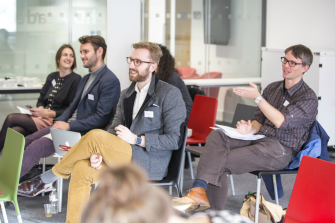Urban Futures PhD student Jacob Fairless Nicholson co-organised the above titled student-led conference in the Autumn term of 2017, hosted by the LSE PhD academy and funded by the London Arts and Humanities Partnership. This write-up of the conference, co-written by Jacob and King’s Classics Department PhD student Sara De Martin, illustrates just one of the many activities PhD students in the domain take part in.
This conference represented a joint effort between a ten-strong organising committee to hold a one-day event for early career and PhD scholars in the Arts and Humanities and Social Sciences to share, discuss and develop their research in a formal yet supportive conference setting. Drawing on the strategic London location LAHP offers, we were able to use the stunning LSE PhD academy to great effect, offering four interdisciplinary panel sessions and a keynote lecture by Dr Alexander Samson across the day. The conference was a great success, pulling together researchers from the UK, Europe and beyond, and benefitted the organising committee in a range of ways.
On the one hand, it offered an unrivalled opportunity for us to refine and develop our skills in conference organising, something several of us noted would be invaluable as we continue forward on our academic trajectories. In the run-up to the conference, this included abstract selection, communicating with delegates, use of social media, venue liaison and teamwork. On the day of the conference, it also meant panel chairing, photography, liaising with delegates, and ensuring other aspects of the conference including the evening meal, ran smoothly. On the other hand, it also represented a great opportunity for the group to develop scholarly relationships with delegates from outside London whilst at the same time nurture a sense of collegiality with other LAHP peers. Similarly, the conference also provided a significant opportunity for establishing connections with students in other disciplines. The program included ten papers, with subjects ranging broadly in the fields of the Humanities. Talking and listening about mobility, we spent a day trtraveling through time and space, gaining awareness on how the mobility paradigm can be successfully applied to various fields, and to studies with very different approaches and aims.
We began the day listening to Johanna Hopp (University of Oxford), who communicated her work on hitchhiking as a psychological experience, focusing on aspects of how this particular mobility is inherently gendered. Then Avital Beirach Barak (Tel Aviv University) and Philip Corran (King’s College London) reflected on experiences of mobility or immobility as forms of resistance to the dominant trends in society. Avital’s paper concentrated on corporeal mobilities, namely the decolonial mobilities of Palestine Parkour groups, and was contrasted by the contribution of Philip, who elaborated on his ‘non-corporeal’ (but still ‘transportive’) mobilities research with elderly disabled Londoners. Various contributions then focused on narratives of mobilities.
Maria Teresa Franco Aguilar (Queen Mary University) talked about Mexican cinematic narratives of urban automobility. Urban movement was also the focus of Lise Villemoes Grønvold (University College London), whose paper dealt with the novels Open City (by Teju Cole, 2011) and 10:04 (by Ben Lerner, 2014). Lise especially stressed how, in these narratives, the high amount of narrated corporeal movement corresponds to a lack of aim and destination in the novels. The same lack of teleology in narrative movements was then identified by Jonathan Lewis (University of Liverpool) in the novel Bel-Avenir (by Akli Tadjer, 2006), which Jonathan presented as a ‘site of transcolonial francophone connection’. The dichotomy ‘mobility-freedom’, Jonathan sought to challenge was also questioned by Semra Horuz (Technische Universität Wien), who talked about the autobiographical travel writings of two Turkish women travelers who lived in the second half of the nineteenth century.
More historically focused papers followed: Michael Economou (University of Oxford) reported on the Greco-Roman Red Sea as a liminal, multi-ethnic space, reflecting also on the dynamics of power and coercion which developed in the area, and, interestingly cautioning about the risk of ‘idealising liminalities’. Susanne Bartels (University of Geneva) then offered us some insights on seventeenth-century guild regulations in Dutch artists’ mobility, while Cosmin Minea (University of Birmingham) shared his research on the conflict between imported aesthetic canons and the will to preserve the Romanian heritage in the process of establishing the Romanian architectural paradigm in the late nineteenth century. Topping off the day was Alexander Samson’s (University College London) very dense keynote, which dwelt (among other points) on ‘errancy’ and ‘border-crossing’ as characteristic conditions of humanity from early modernity onwards (defined by the parallel emerging of the notion of ‘state’), aptly revisiting many of the themes which had been brought up by the speakers earlier in the day.



